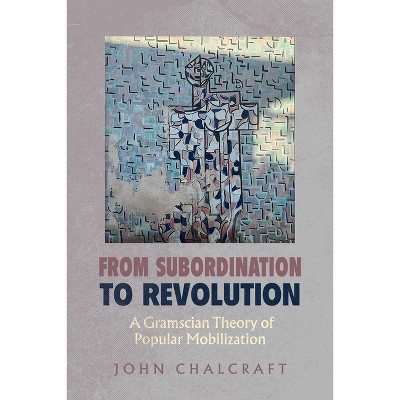Sponsored

Red China's Green Revolution - by Joshua Eisenman (Paperback)
In Stock
Sponsored
About this item
Highlights
- China's dismantling of the Mao-era rural commune system and return to individual household farming under Deng Xiaoping has been seen as a successful turn away from a misguided social experiment and a rejection of the disastrous policies that produced widespread famine.
- About the Author: Joshua Eisenman is associate professor at the University of Notre Dame's Keough School of Global Affairs and senior fellow for China studies at the American Foreign Policy Council.
- 472 Pages
- Social Science, Sociology
Description
About the Book
China's dismantling of the Mao-era commune system under Deng Xiaoping has been seen as a successful turn away from a misguided social experiment. Joshua Eisenman marshals previously inaccessible data to overturn this narrative, showing that the commune modernized agriculture, increased productivity, and laid the foundation for future rapid growth.Book Synopsis
China's dismantling of the Mao-era rural commune system and return to individual household farming under Deng Xiaoping has been seen as a successful turn away from a misguided social experiment and a rejection of the disastrous policies that produced widespread famine. In this revisionist study, Joshua Eisenman marshals previously inaccessible data to overturn this narrative, showing that the commune modernized agriculture, increased productivity, and spurred an agricultural green revolution that laid the foundation for China's future rapid growth.
Red China's Green Revolution tells the story of the commune's origins, evolution, and downfall, demonstrating its role in China's economic ascendance. After 1970, the commune emerged as a hybrid institution, including both collective and private elements, with a high degree of local control over economic decision but almost no say over political ones. It had an integrated agricultural research and extension system that promoted agricultural modernization and collectively owned local enterprises and small factories that spread rural industrialization. The commune transmitted Mao's collectivist ideology and enforced collective isolation so it could overwork and underpay its households. Eisenman argues that the commune was eliminated not because it was unproductive, but because it was politically undesirable: it was the post-Mao leadership led by Deng Xiaoping--not rural residents--who chose to abandon the commune in order to consolidate their control over China. Based on detailed and systematic national, provincial, and county-level data, as well as interviews with agricultural experts and former commune members, Red China's Green Revolution is a comprehensive historical and social scientific analysis that fundamentally challenges our understanding of recent Chinese economic history.
Review Quotes
Exceptionally written.--John A. Donaldson "Journal of Chinese Political Science"
In this thought-provoking volume, Eisenman offers a unique analysis of China's most important local institution in Mao's time: the people's commune.-- "Choice"
Incredibly well-researched . . . Red China's Green Revolution is a fascinating book.--Fabio Lanza "Asia Maior"
Joshua Eisenman brings a refreshing perspective to the field because his book challenges the mainstream evaluation - both inside and outside China - of the era of Mao Zedong.--Mobo Gao "China Information"
Mr. Eisenman calls for readers to look anew at one of the darker periods of human history. It's a worthy intellectual exercise and a useful check on lazy approaches to China's modern history.-- "Wall Street Journal"
The book is well researched, drawing on careful readings of government documents, newspapers and other materials from the period.--Li Zhang "Journal of Asian Studies"
This book is unquestionably well-researched.--Brian DeMare "Journal of Chinese History"
Red China's Green Revolution totally remakes our understanding of Chinese economic development on the eve of Deng Xiaoping's reforms. This carefully documented study shows that rather than being a total failure on the verge of collapse, the commune system introduced under Mao actually resulted in considerable increases in agricultural productivity, which provided a positive foundation for Deng's economic reforms. Joshua Eisenman opens the way for an important reconsideration of how political motivations, rather than economic concerns, were a main driver behind Deng's reforms.--Edward A. McCord, George Washington University
Red China's Green Revolution is a great book. It develops an innovative and contrarian interpretation of China's rural communes, describing a technological revolution that occurred in China's countryside in the 1970s. What makes this book truly outstanding is that Eisenman provides new perspectives on the importance of commune organization and incentive structures, as well as a reassessment of what Maoism meant in the lives of ordinary rural people. One after another, he drags into the sunshine topics that have been overshadowed in recent years by over-simplification and myth-making. The book concludes with a compelling new narrative of elite politics in the late 1970s that explains why the commune was ultimately abolished.--Barry Naughton, Sokwanlok Chair of Chinese International Affairs, University of California, San Diego
Red China's Green Revolution revolutionizes our understanding of the Maoist period and history's biggest experiment with collective agriculture. It challenges the widely held view that the commune was a failure that required privatization, and thus calls into question the very basis by which structural reforms have been legitimated and propagated to shape economic development, not just in China, but around the globe. Everyone who studies contemporary China--and, indeed, the entire neo-liberal project--must confront this book.--Marc Blecher, James Monroe Professor of Politics and East Asian Studies, Oberlin College
Joshua Eisenman questions the conventional wisdom that China's communes, which were failing institutions in the Great Leap Forward of 1958, continued to be so. Eisenman offers hard data to refute the conventional, quasi-official story that before 1978 China's rural economy was in dire straits, requiring neoliberal efficiencies to fix it.--Lynn T. White, Princeton University
This is a truly important book. Eisenman shows how the People's Communes created contemporary China, both through what they built and through what they destroyed. His work is of enormous significance for anyone trying to understand China's road from revolution to reform.--Odd Arne Westad, S. T. Lee Professor of U.S.-Asia Relations, Harvard University
About the Author
Joshua Eisenman is associate professor at the University of Notre Dame's Keough School of Global Affairs and senior fellow for China studies at the American Foreign Policy Council. He is coauthor of China and Africa: A Century of Engagement (2012) and coeditor of China Steps Out: Beijing's Major Power Engagement with the Developing World (2018).










